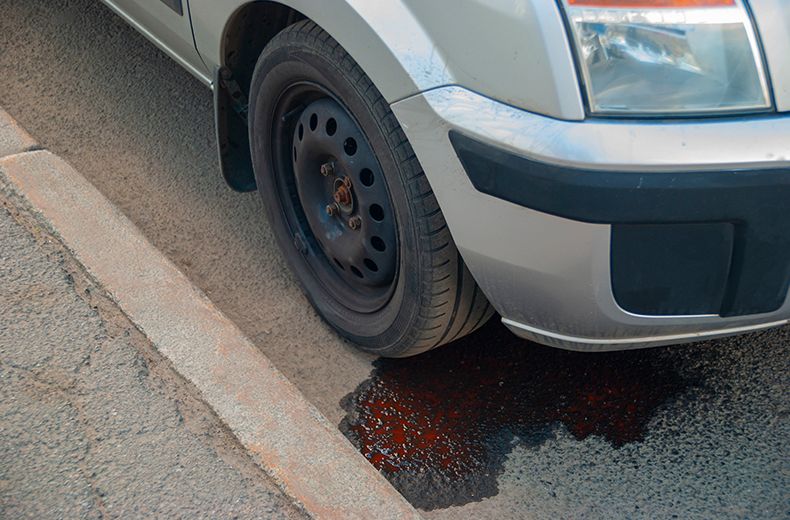Gas may leak from the bottom of a car due to a damaged fuel tank or fuel line. Rust, corrosion, or a loose cap could also be the cause.
If you notice a gas leak, it is crucial to address the issue immediately to prevent potential fire hazards and environmental damage. Gas leaks from the bottom of a car pose serious safety and environmental risks. Identifying the root cause of the issue is essential to prevent accidents and ensure the vehicle’s proper functioning.
Understanding the common reasons for gas leaks from the bottom of a car and taking appropriate measures can help maintain safety on the road. We will explore the potential causes of gas leaks and provide insights on how to address and prevent these issues, ensuring a safe and reliable driving experience.
Common Causes Of Gas Leaks
Corrosion Of Fuel Lines
Corrosion of fuel lines can lead to gas leaks. Rust weakens the metal, causing cracks.
Faulty Fuel Tank Seals
Faulty fuel tank seals allow gas to leak from the bottom of the car.

Credit: www.youtube.com
Impact Of Gas Leaks
Gas leaks from the bottom of a car can occur due to various reasons, including worn-out fuel lines, loose connections, a damaged gas tank, or a faulty fuel pump. It is crucial to address these issues promptly to prevent potential hazards and ensure vehicle safety.
Impact of Gas LeaksGas leaks in cars can have various impacts, ranging from safety hazards to environmental concerns. Understanding these impacts is essential for ensuring the well-being of both individuals and the planet. In this section, we will delve deeper into the reasons why gas leaks occur at the bottom of a car and explore the potential consequences they bring.Safety Hazards
Gas leaks from the bottom of a car pose significant safety hazards. Being highly flammable, gasoline can easily ignite if exposed to even a small spark. This can lead to fires, explosions, and serious injuries to both passengers and bystanders. Moreover, the accumulation of gas fumes inside the car can create a suffocation risk. Inhaling these fumes can lead to dizziness, nausea, and in extreme cases, loss of consciousness. It is crucial to address gas leaks promptly to prevent the occurrence of such dangerous situations.Environmental Concerns
Beyond the immediate safety risks, gas leaks from cars also contribute to environmental concerns. Gasoline is a toxic substance that can contaminate soil, groundwater, and air. When leaked gas reaches water sources, it can harm aquatic life and pollute the ecosystem. Moreover, gas fumes contain volatile organic compounds (VOCs), which contribute to air pollution and the formation of smog. These pollutants have detrimental effects on both human health and the environment, exacerbating respiratory issues and contributing to climate change.Table: Comparison Of Safety Hazards And Environmental Concerns
| Safety Hazards | Environmental Concerns |
|---|---|
|
|
Signs Of Gas Leaks
Gas leaks from the bottom of a car can be a serious safety concern. It’s imperative to identify the signs of gas leaks quickly to prevent any potential hazards. If you notice any of the following indicators, it’s important to address the issue promptly.
Smell Of Gasoline
One of the most obvious indications of a gas leak is the pungent smell of gasoline around the car. Even a faint gasoline odor should not be ignored as it could mean that there is a leak somewhere in the fuel system. If you detect this smell, it’s crucial to investigate immediately to prevent any potential fire hazards or environmental damage.
Visible Puddles Under The Car
Another clear sign of a gas leak is the presence of visible puddles of gasoline under the car. If you notice any wet spots or puddles of liquid with a gasoline-like appearance underneath your vehicle, it’s critical to address it right away. This could be a strong indicator that there is a leak in the fuel system that needs to be addressed immediately to ensure safety and prevent further damage.
Preventive Measures
Gas leaks from the bottom of a car can lead to hazardous situations, making it crucial to take preventive measures to ensure vehicle safety and prevent potential accidents. Implementing proactive steps can help avoid gas leaks and maintain the integrity of the vehicle’s fuel system. By prioritizing preventive measures, car owners can reduce the risk of gas leaks and protect both their vehicle and the environment from the potential dangers associated with fuel leakage.
Regular Maintenance Checks
Educating car owners about the significance of regular maintenance checks is essential to avoid gas leaks. Inspecting the fuel lines, connections, and the fuel tank for any signs of damage or wear is critical. Additionally, scheduling routine maintenance appointments with a certified mechanic can help identify and address potential issues before they escalate, ensuring the vehicle’s fuel system remains in optimal condition.
Prompt Repairs
Encouraging prompt repairs for any identified issues related to the fuel system is vital in preventing gas leaks. Addressing even minor leaks or damages promptly can prevent them from worsening and causing potential safety hazards. Whether it’s a cracked fuel line or a damaged fuel tank, prioritizing immediate repairs can significantly reduce the risk of gas leaking from the bottom of the car and uphold the safety of the vehicle.
Professional Inspection And Repair
If you suspect gas leaking from the bottom of your car, it’s crucial to seek professional inspection and repair. Potential reasons include a damaged fuel line, cracked gas tank, or loose fittings. Prompt attention is essential to avoid safety hazards and prevent further damage to your vehicle.
If you suspect a gas leak from the bottom of your car, seeking professional help is crucial. Gas leaks can be hazardous and should be addressed promptly to ensure your safety on the road. Repairing a gas leak requires specialized knowledge and expertise that a professional mechanic possesses. Let’s explore the importance of seeking professional help and the process of repairing a gas leak.Seeking Professional Help
When dealing with a gas leak, it’s essential to rely on the skills of a trained professional. Attempting to fix the issue yourself may lead to further damage or even injury. Automotive experts have the necessary equipment and knowledge to pinpoint the exact location of the gas leak quickly. By entrusting this task to professionals, you can save both time and money in the long run.Repairing Gas Leak
Repairing a gas leak requires a systematic approach to eliminate the problem effectively. Once the location of the gas leak has been identified, the mechanic will carefully inspect the damaged area to determine the best course of action. Depending on the severity of the leak, various repair methods may be employed, such as:1. Replacing damaged components: This involves inspecting the fuel lines, fuel tank, or other parts of the fuel system for any visible damage. If a component is found to be faulty or worn out, it will be replaced with a new one.2. Sealing the leak: In some cases, the leak may be small and can be sealed using specialized sealants or repair kits. The mechanic will assess the size and location of the leak to determine the most suitable sealing method.3. Welding or soldering: In situations where the gas leak is caused by a crack or hole in the gas tank, welding or soldering may be necessary. These repair techniques require expertise to ensure a secure and long-lasting fix.4. Pressure testing: After the repair is completed, the mechanic will perform a pressure test to ensure that the gas leak has been adequately resolved. This test involves pressurizing the fuel system to verify its integrity and check for any remaining leaks.By relying on professional inspection and repair, you can have peace of mind knowing that the gas leak has been effectively resolved. Remember, gas leaks should never be ignored, as they can pose a serious danger to both you and other road users. Taking swift action by seeking professional help is crucial for your safety and the longevity of your vehicle.
Credit: www.rac.co.uk
Legal And Insurance Considerations
Liability Issues
Liability for gas leaking from a car rests with the driver, who must ensure proper maintenance.
Insurance Coverage
Most auto insurance policies cover damage from gas leaks, but specifics may vary.
Diy Vs. Professional Repair
Gas leaking from the bottom of a car can be a serious issue. DIY repairs may seem cost-effective, but only a professional can correctly diagnose and fix the problem. Safety concerns and potential damage to the vehicle make professional repair the best choice.
Pros And Cons Of Diy Repair
Benefits Of Professional Repair
4 reasons why gas is leaking from the bottom of a car can help resolve the issue. When it comes to addressing this problem, the debate of DIY repair versus professional repair is essential.For DIY repair, pros include cost-effectiveness and the sense of accomplishment. However, cons involve potential risks and lack of expertise.Professional repair offers specialized knowledge and warranty benefits. It ensures efficient and accurate resolution, reducing the risk of further damage.Credit: www.e90post.com
Conclusion
To conclude, gas leakage from the bottom of a car can be caused by various reasons. Identifying the source of the leak is crucial in order to prevent any further damage or potential dangers. Regular inspection, maintenance, and seeking professional help can help rectify the issue and ensure the safety of both the vehicle and the occupants.
Stay vigilant and address any signs of gas leakage promptly for a smooth and worry-free driving experience.


